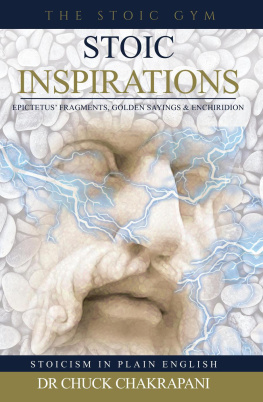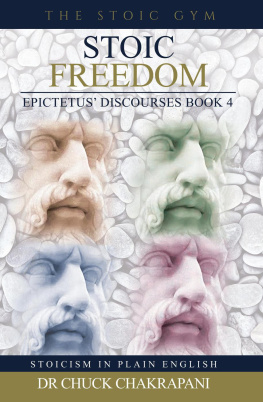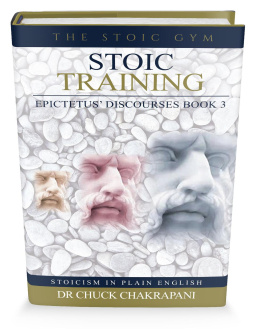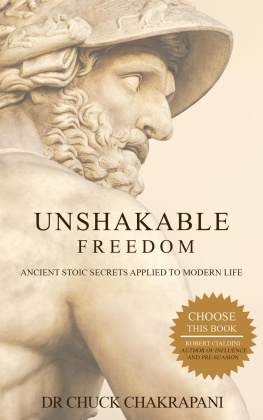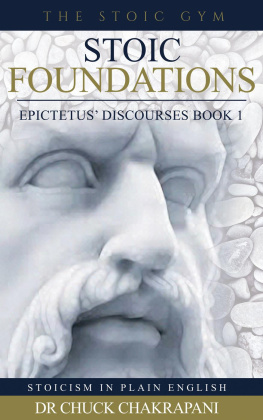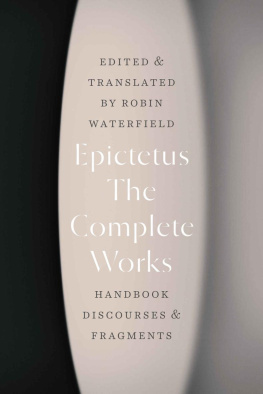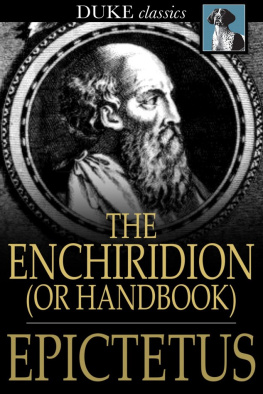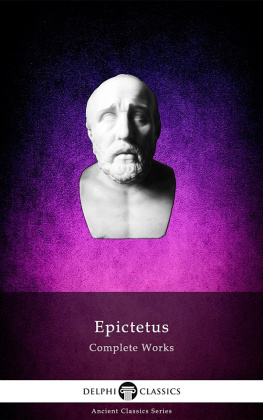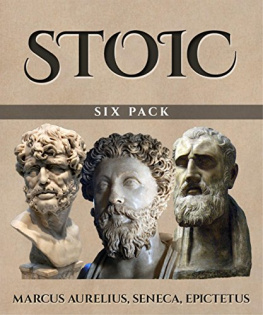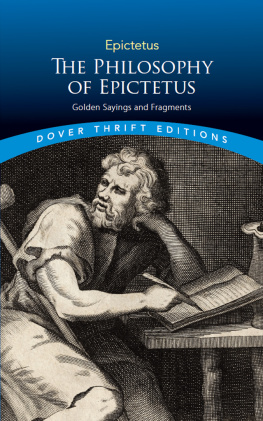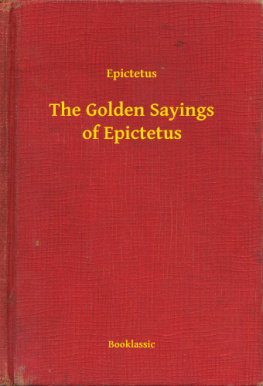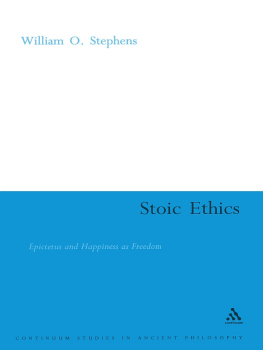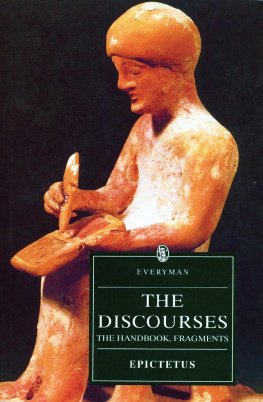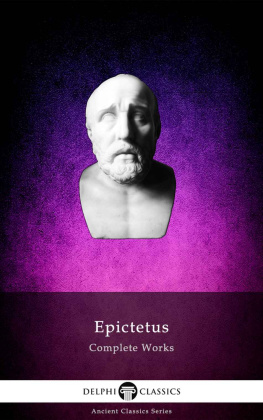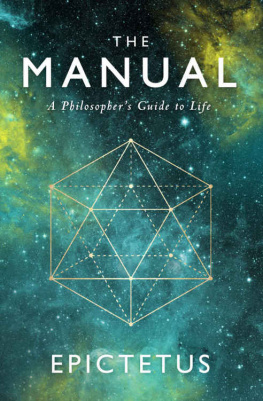Stoic Inspirations
Epictetus Fragments,
Golden Sayings & Enchiridion
Stoicism in Plain English
Dr Chuck Chakrapani
The Stoic Gym Publications
Copyright 2018 by Chuck Chakrapani
All rights reserved. No part of this publication may be reproduced, distributed or transmitted in any form or by any means, including photocopying, recording, or other electronic or mechanical methods, without the prior written permission of the publisher, except in the case of brief quotations embodied in critical reviews and certain other non-commercial uses permitted by copyright law. For permission requests, write to the publisher, addressed Attention: Permissions Coordinator, at the address below.
Stoic Gym Publications
www.thestoicgym.com
Ordering Information:
Quantity sales. Special discounts are available on quantity purchases by corporations, associations, and others. For details, contact the Special Sales Department at the address above.
Stoic Foundations/Chuck Chakrapani. 1st ed.
ISBNs:
Print: 978-0-920219-40-9
ePub: 978-0-920219-41-6
Mobi: 978-0-920219-42-3
PDF: 978-0-920219-43-0
17 18 19 20 21 22 23 24 25 261 2 3 4 5 6 7 8 9 0
Contents
What is in This Book
Some new material, but mostly a summary
T his book contains a biography of Epictetus, the sayings of Epictetus (also called Fragments, some of which are not in any of the precious four books in this series) and two summaries of the works of Epictetus. The two summaries Enchiridion and the Golden Sayings draw heavily from Discourses . Enchiridion and the Golden Sayings themselves have some overlap between them, This is not necessarily a bad thing when one tries to internalize the profound truths of Stoic thoughts and be inspired by them.
Consequently the primary purpose of this book is to reinforce what we have already learned in the previous four books. It can also be an inspiring reminder of the principles learned earlier and lead us to a life of serenity, happiness and freedom..
Heres an outline of what is in this book:
Contents of this book
1. The man who was Epictetus
The opening chapter of the book outlines the life and times of Epictetus, whose teachings we have explored in the previous four books in this series and continue to explore in this book.
2. Fragments (Epictetus, as quoted by others)
The second chapter is a collection of Epictetus sayings as quoted by others. They are not too numerous, but the collection does contain quotes not found in Discourses . Although a number of quotes have been attributed to Epictetus our collection is limited to what has been confined to what has been judged to be authentic or near-authentic quotes.
3. The golden sayings of Epictetus
These are extracts from Epictetus works, mostly from Discourses and Fragments. The extracts were initially translated and compiled by Hastings Crossley during the early 20th Century. Although it is a good summary of Epictetus teachings, it is longer than the other summary Enchiridion , compiled by Arrian. Many passages in The Golden Sayings have a devotional slant.
4. Enchiridion (The Handbook)
Enchiridion or The Handbook is a compilation of Epictetus teachings. It is short and is one of the best-known books on Stoicism. (It is also available as a separate volume, published by The Stoic Gym.)
A note on the plain English version
Like the other books in this series, this is a plain English version. This means I have used modern English as well as simple word and sentences. I have also tried to use non-sexist language and used titles, subtitles, and comments to make it easy for the contemporary reader. Occasionally, I have even shortened some passages.
There is some trade-off, however, resulting in differences between this version and literal translations. While they may mean the same thing, if you need the literal translation for scholarly purposes, you should consult other sources that are widely available.
Part 1
Who Was Epictetus
Anthony and Cleopatra vs. Octavian:
The founding of Nicopolis
I n 31 BCE, in the Ionian Sea near Berenkea, the navy of Anthony and Cleopatra fought fiercely that of Octavian. In this major naval battle, Octavian defeated Anthony and Cleopatra.
To celebrate his success, Octavian built the city of Nicopolis (Victory City). It was a flourishing city and at its peak had a population of 150,000. (The ruins of the city now stands in the outskirts of the modern city of Preveza in Greece.)
A lame philosopher arrives
Some 50 or so years later, a lame philosopher arrived there after being expelled from Rome by Emperor Domitian. He founded a philosophy school there and began teaching well to do Romans and others on how to flourish in life. He lived there until his death over forty years afterwards.
The exiled philosopher achieved fame while he was still alive. Many prominent people, including the Emperor of the Roman Empire, were influenced by his teachings.
His influence continues to this day, some two thousand years afterwards. Among other things, his teachings influenced three schools of modern psychotherapy and provided guidance to people from different walks of life.
- Who was he?
- What was his name?
- When was he born?
- When did he die?
- Was he really lame?
- How did he become lame?
It is said that his name was Epictetus, he was born in 55 CE and died in 135 CE. He became lame because, when he was a slave, his master broke his leg for fun. While these facts are not very often challenged, we really dont know if any of it is true.
What do we know about this philosopher, whom we call Epictetus? The next section answers some questions about Epictetus life.
The Life of Epictetus: What we know
Here is what we know for sure about Epictetus.
When was he born?
Sometime between 50-60 CE, often assumed to be 55 CE. He was of Greek parentage.
Where was he born?
Probably in Hierapolis (currently known as Pamukkale), Phrygia. It was a major Greco-Roman city situated in modern day Turkey, about 170 kilometres east of Ephesus, connected by road.
How did he become a slave?
We cant be sure, but the generally accepted version is that his mother was a slave and, when he was born, he was already a slave.
When did he come to Rome?
When he was about five years old.
What was his real name?
We are not sure.
Why not?
Epictetus means acquired. We dont know whether it was his real name or people just called him that. We are not even sure if he was even named by his mother.
Next page
